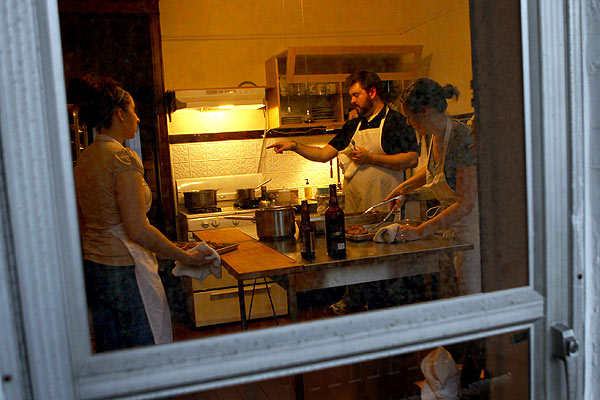
From left to right: Christine Cikowski, Josh Kulp, and Jenny Brown, a staffer, prep dinner in the kitchen
Over the past five years, as a chef and a founder of Sunday Dinner Club, I have hosted roughly 5,000 people at my home. All but one were invited.
During a dinner last fall, a high-booted woman unquestionably compromised by various substances walked in my back door, through the kitchen, and into the bathroom. Thinking her a guest I hadn’t accounted for, I panicked. After five minutes of wondering what she was doing in my bathroom, I finally got the nerve to knock. No answer. When I opened the door, there she was, trying desperately to pull out her hair. Upon questioning the woman, my business partner, Josh Kulp, and I realized she wasn’t a guest after all—just some whacked-out chick who thought she would crash a house party. We asked her to leave, and after loudly protesting this mistreatment, she went out the way she came in.
Inviting people who are not quite strangers but not yet acquaintances into my home four to eight times a month for $45 to $75 BYO dinners lends itself to a life of constant surprises. It is a strange feeling to answer my door—or enter my bathroom—and not know who is going to be there. But the uncertainty is a great tradeoff for avoiding the standard professional kitchen paradigm, which involves considerably more uncertainty: You go to culinary school and work your heart out on a line for little compensation for years in hopes that at some point you are promoted to the coveted position of chef; then, if you are, you work even harder.
Josh and I, both Kendall College grads with solid experience in Chicago restaurants, got a license to serve food and started SDC to avoid those conventional (and pressure-filled) restaurant constraints. Instead of being tied to someone else’s menu, Josh and I cook the food we want to eat. Instead of getting caught in the mad rush of a restaurant kitchen, we can take our time and enjoy the process of rolling perfect pasta. Instead of dealing with the nightly crapshoot of customers who may or may not be pleasant, we cultivate our mailing list by referral, which means we get friends and friends of friends and friends of friends of friends. And instead of worrying about how many will walk in the door or how fast we need to turn a table, we have one hyperlocal, seasonal menu for 20 people per dinner—the same meal we eat in the kitchen with our staff. When we’re done, we pull up a chair alongside our guests and have a beer (or two).
Though Josh and I make 2,000 granola bars a week (Eat Green Foods) and run a burger booth at the Green City Market on Saturdays, Sunday Dinner Club is the foundation of our business and enough to support us. As a result, we can focus on the reason we became chefs: to prepare small meals with love and without compromise. This ultimately translates to the kind of food people want to eat. Our guests, after hearing directly from us about the ingredients and the farmers we work with, cannot help but feel more connected to the food on their plate. They know where it comes from and they care. Our constant declarations of passionate love for pork, duck fat, and fried dough only deepen the usual dining experience. In response to all this, we’ve watched our member list slowly grow to 1,500 names—nurtured by the soil of our guests’ address books—and branch out like a big family tree, minus the dysfunction.
There is no curtain to pull back on our corner of the underground dining world. No culinary wizards to uncloak, no flashing lights or fancy gadgets or attempts to do something secret. We just want to serve good food in a home environment to cool people, strangers and friends alike.
As long as they have an official invite.
Photograph: Chicago Tribune photo by Scott Strazzante


